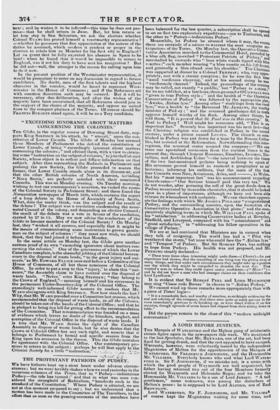"EXCEEDING IGNORANCE ABOUT MATTERS CONCERNING THE COLONIES."
THE Globe, in the regular course of Downing Street duty, sup. ports King SEEPHEIV in his attack, by " utensil," upon the con- stitution of Lower Canada. The Globe of Monday last accused those Members of Parliament who defend the constitution of Lower Canada, of being " exceedingly ignorant about matters concerning the colonies ;" and advised them, with a view to obtain- ing some "instruction on the subject of colonies," to join theColonial Society, whose object is to collect and diffuse information on that subject. After thus reproaching the Rudicals in Parliament and praising the new Society, the Globe proceeded to assure the former, that Lower Canada stands alone in its discontent, and that the other British colonies of North America, including "Nova Scotia," are perfectly satisfied with their nominated Councils. This was on Monday evening. On Tuesday morning, wishing to test our contemporary's assertion, we visited the rooms of the Colonial Society in Parliament Street ; and there found the Novascotian newspaper of March 10th, which contains the report of a long debate in the House of Assembly of Nova Scotia. What, dues the reader think, was the subject and the result of the debate ? The subject was a resolution condemning the nomi- nated Council of the colony, and demanding an elective Council ; the result of the debate was a vote in favour of the resolution, carried by 27 to 15. May we now advise the conductors of the Globe to become members of the Colonial Society ? On Monday last, they "wished it all success, and especially that it might be the means of communicating some instruction to grown gentle- men on the subject of colonies : " they must now wish, we should think, that they had joined it before last Monday.
In the same article on Monday last, the Globe gave another curious proof of its own "exceeding ignorance about matters con- cerning the colonies." One of the grievances of which the Lower Canadians complain, is the shameful jobbing of the Colonial bureau- cracy in the disposal of waste lands, "to the great injury and nui- sance." as Mr. EDWARD ELLICE once said before a Committee of the House of Commons, of all but those nominees of the Colonial Office. In order to put a stop to this "injury," to abate this "nui- sance," the Assembly claim to have control over the disposal of waste lands. "Never," cries King STEPHEN; "they belong to the Crown of England,"—meaning himself and his successors in the permanent Under-Secretaryship of the Colonial Office. The exceedingly well-informed Globe assures its readers that Mr. WARD also agrees with King STEPHEN. Now how stands the fact ? Why, that Mr. W ARD presided over a Committee last session, which recommended that the disposal of waste lands, in all the Colonies, should he taken out of the hands of the Colonial Office; and that he is pledged to bring in a bill for giving effect to the recommendation of the Committee. That recommendation was founded on a mass of evidence which leaves no doubt of the blunders, neglect, and corruption of the Colonial Office in the disposal of waste lands. It is true that Mr. WARD denies the right of the Canadian
Assembly to dispose of waste lands, but he also denies that the Crown or Colonial Office has any such right, and asserts that it
belongs to Parliament by formal and specific cession from the King upon his accession to the throne. This the Globe mistakes for agreement with the Colonial Office. Our contemporary pro- mises to return to the subject : perhaps he will first apply to the Colonial Society for a little "instruction,"


























 Previous page
Previous page